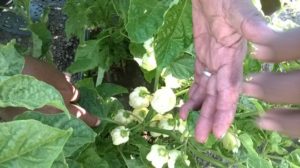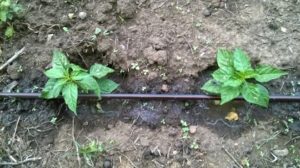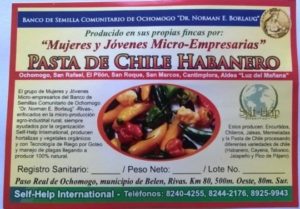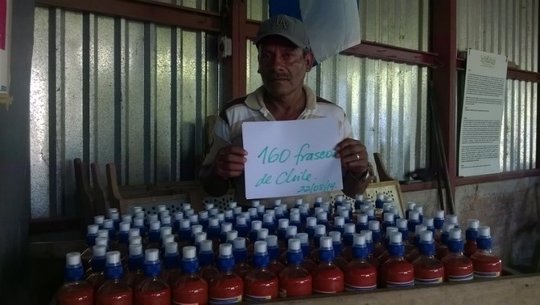
After hearing about the successes experienced at the Fred Strohbehn Training Center, the farmers that Self-Help works with in Ochomogo began asking for a value-added training sessions as well. We invited the seed producers, members of the Norman Borlaug Ochomogo Community Seed Bank, and their wives to participate in a training session for SHI’s new gardening program that uses drip irrigation. This was the first time the women had been involved in the activities of the seed bank.

Teofilo’s crops
Most of the women said that they would like to come to participate in the training session and be part of the program as well as they can use these new skills when they have free time in their homes. Teófilo, a farmer who lives in the community of Luz del Mañana, located 16 kms from the seed bank, came to the training. Teófilo had to ride two buses to attend the session. The first one was taken at 6:00 a.m., it’s the only one they have in his community which gets to the main road, then he took a second bus which gets to Ochomogo, and then he walked all the way to the Seed Bank with 70 pounds of habaneros peppers in his shoulders.

Demonstration plot at Ochomogo Seed Bank
Teófilo was determined and wanted to learn how to add value to his peppers. He has a plantation of habanero hot peppers on his farm and sometimes he experiences post-harvest loss when he can’t sell them all before they spoil. He was really excited to hear that Self-Help can teach him how to take advantage of all the peppers by making hot pepper sauce and pickling vegetables.
For the first training session, Teófilo brought around 18 pounds of habaneros peppers to share with the rest of the group since they didn’t have anything to work with.. For the second training he brought around 70 pounds of habanero peppers.
SHI staff also worked on the design of the labels for the hot pepper sauce, and purchased all the plastic containers to package them. The label shows the name of the peppers being used, the name of the seed bank, the name of each community involved and information about Self-Help International.

Habanero label
From the 70 pounds of hot peppers, Teófilo and the farmers made 160 units of hot sauce in plastic containers
There are still details to work out such as the date of production, the expiration date, the percentage of preservatives we need to apply on the products, the sanitary issues among others. As for right now, priority for SHI staff is making sure that all farmers start implementing hot peppers in their own gardens so they have the products in their homes instead of buying it.

Teofilo displays bottles of his sauce
At the next field day training session at the Ochomogo Seed Bank farmers learned how to work with an irrigation system and how to manage it. Together with staff, attendees worked on the drip irrigation system at the seed bank.
In the future, SHI staff plans to help farmers implement the drip irrigation system on their own farms and in gardens. Teófilo is one of the first users of this new technology to ensure he has a year-round supply of habanero chili peppers to sell.
Your donation has helped farmers, like Teófilo, grow their businesses by using new technology and including value-added products. Thank you for your support.

Powered by Wapiti Digital #servetheherd

Join us on Wednesday, February 11th @ 5:30-7:30 PM
Sip wine, nibble on tasty bites, and help spread love across the globe!
This is my rich text.
This is more rich text.
I am a list
Lists are cool